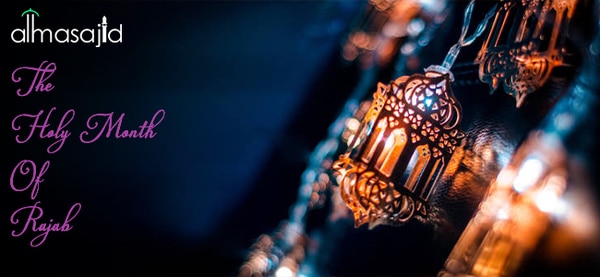Rajab is the seventh month of the Islamic calendar. It is one of the four sacred months designated by Allah (SWT), making it of special significance along with Dhul-Qadah, Dhul Hijjah, and Muharram. There are many blessings to be sought in Rajab, but it is an incredibly religious time as several key events took place during this month, too.
Rajab Mean
When translated to English from Arabic, ‘Rajab’ means ‘to respect’. There are several variations of the name of the month of Rajab, including Rajab al-Murajjab which means ‘extraordinary honor’. It is also sometimes called Rajab al-Asamm which means ‘deafening and silent’, relating to the fact that warfare and fighting were banned during this time.
Another name the month often goes by is Rajab the Separate One. This is because Rajab does not fall next to the other three sacred months – it is on its own.
Rajab Month Significance
Rajab is a significant Islamic month since Allah (SWT) selected it as one of the four designated times when violence and warfare are categorically prohibited. The Hajj is surrounded by the other three holy months, which occur one after the other.
Allah (SWT) made Dhul al-Qadah and Dhul Hijjah sacred so that Muslims might perform their religious obligation of performing the Hajj without fear of assault. He also made Muharram sacred so that Muslims could return home in safety after performing the Hajj.
Rajab doesn’t fall close to Hajj, but it was dedicated as a sacred month so that Muslims can carry out Umrah (the smaller, non-obligatory pilgrimage to Mecca), in safety. Like the other three sacred months, both good and bad deeds are judged and rewarded/punished more severely during Rajab, highlighting the religious importance of the month.
The Prophet (PBUH) said Rajab is the month of Allah (SWT). He recited: “Rajab is the month of Allah, Sha‘ban is my month and Ramadan is the month of my Ummah.” [Suyuti]
Rajab and its virtues
Being a sacred month, committing a sin therein is much more severely punished. On the other hand, we are taught that the reward for acts of obedience performed in this month is greater than in other months.
Divine mercy, blessings, and rewards are at their peak during the sacred months; we must therefore invest our time in increased acts of ibadah, we should increase our recitation of the Quran, and our dhikr, should help others and give more charity.
Rajab is a month of cultivation, so plant your seeds
Abu Bakr b. al-Warraq al-Balkhi used to say: “In the month of Rajab, you sow the seeds, in Sha`ban, you irrigate them, and in Ramadan, you reap the harvest.”
We hope you can use this sacred month to increase your good deeds, draw closer to Allah, His Messenger and the Muslims, and plant the seeds for a fruitful Ramadan.
Oh Allah! Grant us Barakah (Blessing) during (the months of) Rajab and Sha’ban, and allow us to reach Ramadan.
Making the Most of Rajab
A month of miracles and peace, there are many ways you can make the most of Rajab. Fasting in the month of Rajab is one of the ways many people choose to get closer to Allah (SWT), but there is no specific guidance on which days are preferable.
Another way Muslims can make the most of Rajab is to make dua. “There are five nights in which a du’a is not rejected: Thursday night, the first night of Rajab, the night of mid-Sha’ban (15th night), the night of Eid al-Fit,r and the night of Eid al-Adha.” [Shu’b al-Iman]
Giving to charity is a good way to get closer to Allah (SWT) and make good with the Creator. We have a number of appeals that you may donate to in Rajab, all of which will cleanse your soul and for which God will duly reward you. Please give what you can this Rajab and help someone in need while cementing your faith in Allah (SWT).
“Charity extinguishes sins just as water extinguishes fire.” [Ibn Majah]















